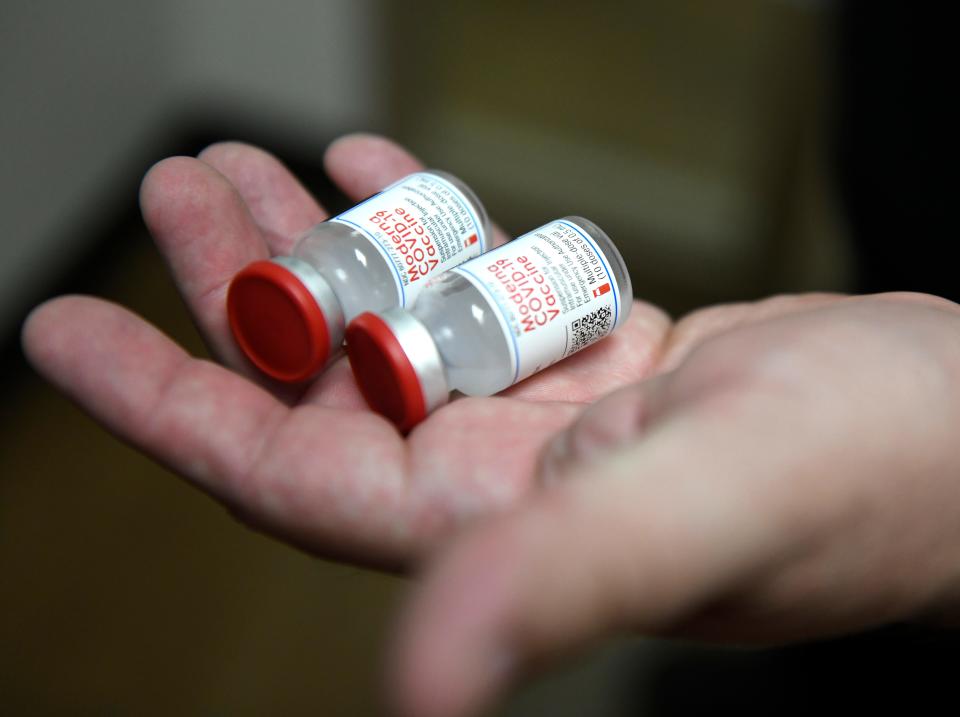City officials may return a $75,000 grant for vaccine education. Here's why.
City officials may not accept a $75,000 grant for vaccine-related initiatives three months after the award, following questions about the program’s focus.
In large part, criticism revolves around one of the two types of vaccine named in the original grant — specifically, COVID-19 immunizations.
City Council members Mike Pusley, Michael Hunter and Gil Hernandez had requested that the grant return for discussion earlier this week, a move driven in part by what they cited as potential side effects of the vaccine.
Constituents have been voicing concerns, Pusley said, addressing Fauzia Kahn, health director.
“All you have to do is turn the news on. There are a lot of discrepancies you hear back and forth about the COVID vaccine and whether it helps or not,” he said. “Maybe 10 years from now or 15 years from now, we’ll have the solid answers. But at this point I don’t think we do, and I just want to be sure that we’re educating people to that fact.”

As a general rule educational documents on all vaccines are provided to clients, Khan told the council.
“It’s a choice,” she said. “We have never forced (the) vaccine, we have never pushed (the) vaccine.”
What the grant says
Grant documents that had been accepted by the council in January listed the program’s focus as improving “understanding of current barriers to COVID-19 and influenza vaccinations for adults” through community engagement and information gathering, according to city records.
Known as Partnering for Vaccine Equity, among the program's end goals had been fostering relationships between medical professionals and the community, increasing vaccination uptake and improving accessibility, the documents show.
The local program’s focus, however, changed after the department submitted the initial application, Khan said.
The scope has shifted from COVID-19 and influenza vaccines and it all medically recommended vaccines, Khan said, noting legislative action.
Recently enacted statute now means that agencies receiving funding through the state’s health services may not “single out” the COVID-19 vaccine compared to others, according to the Texas Department of State Health Services’ website.
However, the COVID-19 vaccine may have the same educational treatment and information about availability as others recommended by the Advisory Committee on Immunization Practices, according to the state agency.
Surveys have been completed that did not discuss COVID-19 but instead discussed immunizations and how residents receive information from the health department, Khan said.
“It’s a way to understand, what are the barriers that our community sees, what are the challenges, where do they want to get information,” she added.
A communications plan has not yet been developed but would encompass all vaccines, Kahn said. She had hoped to include town hall meetings and other events to connect residents with medical resources.
Within the original program scope shown in the application, populations intended to be the focus of engagement were black communities and LGBTQ communities because of historical disparities in health outcomes, she said.
The survey was later expanded to the general population.
Under the agreement, the grant would cover eligible program expenditures via reimbursement.
The health department’s changes in the program scope — including the target audience and vaccine types — aren’t formally documented as part of the contract, city officials said, leading to later criticism on whether the grant would valid without documentation.
Hernandez, Hunter, Pusley, Everett Roy and Mayor Paulette Guajardo voted to reverse January's grant acceptance.
In dissent were City Council members Sylvia Campos, Jim Klein, Roland Barrera and Dan Suckley.
A second vote Tuesday would be required to finalize the decision.
The outcome earlier this week was disappointing, Klein said, noting a number of physicians who had attended the meeting.
The medical professionals had appealed to the council to retain the grant, asserting the importance of immunizations.
“That didn’t seem to resonate with all the councilmembers,” Klein said. “And that was disturbing.”
Among those who spoke was the city’s local health authority, Srikanth Ramachandruni, who told the council there are minimal risks of severe side effects associated with the COVID-19 vaccine.
The city has so far incurred about $30,000 in expenses toward the program, officials said. It had been expected the funding would be reimbursed through the grant.
If reimbursements are not available, the costs would be covered through the existing budget, vacancy savings and “if necessary, cuts in planned expenditures in the future,” wrote City Manager Peter Zanoni in a message to the Caller-Times.
More: Months after rebuilding health district, Corpus Christi hires new health director
More: From obscurity to Nobel nomination: Scientists acclaimed for patent-free COVID-19 vaccine
More: Texas family waits for recourse after 21-year-old's rare, severe reaction to COVID-19 vaccine
This article originally appeared on Corpus Christi Caller Times: Corpus Christi council rejects $75,000 grant for vaccine education

